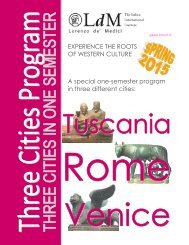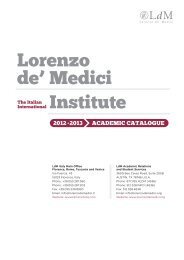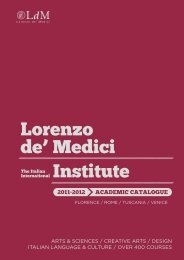aCademiC Catalog 2013-2014 - Lorenzo de Medici
aCademiC Catalog 2013-2014 - Lorenzo de Medici
aCademiC Catalog 2013-2014 - Lorenzo de Medici
You also want an ePaper? Increase the reach of your titles
YUMPU automatically turns print PDFs into web optimized ePapers that Google loves.
principles and implications of humanitarian intervention, as well<br />
as collective security, self-<strong>de</strong>termination, national sovereignty<br />
and self-<strong>de</strong>fense. The course next addresses various possible<br />
responses to intra-state conflicts, ranging from third-party<br />
mediation to coercive measures, post-conflict management<br />
and transitional policies. Stu<strong>de</strong>nts <strong>de</strong>al with the following<br />
issues: a) the “peace-enforcement dilemma” (affecting<br />
peacekeeping operations, humanitarian relief, security, human<br />
rights and law and or<strong>de</strong>r enforcement); b) state-building<br />
processes in highly divi<strong>de</strong>d post-conflict societies (involving<br />
i<strong>de</strong>ntity and citizenship, perceptions by different communities,<br />
party behavior, institutional and political accommodation). The<br />
final part focuses on implementation with particular reference<br />
to the following crucial issues: a) cooperation and competition<br />
between international players at all levels; b) the negative<br />
impact of inter- and intra-organizational disagreement on<br />
the whole process; c) monitoring and evaluation. Throughout<br />
the course stu<strong>de</strong>nts analyze specific recent and current case<br />
studies (e.g. Somalia, Bosnia, East Timor, Kosovo, Sudan),<br />
involving the UN, NATO, and numerous NGOs.<br />
Prerequisites: PST 190 Anthropology of Violence and Conflict,<br />
or PST 302 Peace Education, or equivalents<br />
A Sociology for Peace<br />
PST 370 F; Dual listed: SOC 370 F<br />
Cr: 3; Contact hrs: 45<br />
This course analyzes the processes through which wars become<br />
reality, addressing methods to predict them and preventive<br />
activities. The approach differs from that of traditional studies<br />
of war, which focus on causes (different in each conflict), of<br />
limited usefulness in finding ways to avoid war. The course also<br />
consi<strong>de</strong>rs various types of intervention such as the interposition<br />
of peacekeepers (armed and especially unarmed), and “tertiary<br />
prevention” activities that can be <strong>de</strong>ployed after a war in or<strong>de</strong>r<br />
to help prevent renewal of armed conflict. The same strategy<br />
will be used for peace. Stu<strong>de</strong>nts analyze the process through<br />
which peace can be attained in all possible phases such as<br />
the construction of a culture for peace, confi<strong>de</strong>nce-building,<br />
analysis of so-called superordinate objectives (common to both<br />
adversaries), and the isolation of solutions acceptable to both<br />
parties. The central theme of the course is non-violence viewed<br />
as a force that can work to overcome injustice. This entails<br />
examination of the constructivist approach (in which values and<br />
science are connected) and of the sociological principles that<br />
form the basis of the non-violent approach. The course bridges<br />
theory and practice, utilizing case studies, training in nonviolent<br />
conflict resolution and similar activities (role playing,<br />
cooperative games, maieutic laboratories, brainstorming, etc.),<br />
and documentary films. The course aims to give stu<strong>de</strong>nts the<br />
capacity to utilize non-violent approaches to solve problems at<br />
both interpersonal and international levels.<br />
Prerequisites: Junior standing or concurrent enrolment in the<br />
International Conflict Transformation Certificate<br />
Philosophy and Religious<br />
Studies<br />
Western Philosophy<br />
PHR 130 F<br />
Cr: 3; Contact hrs: 45<br />
This course presents major questions and thinkers of western<br />
philosophy. Key methods and terms of philosophical inquiry<br />
are explored. Provi<strong>de</strong>s a broad overview of major historical<br />
directions, systems and schools of philosophy in the western<br />
tradition from the pre-Socratics to the present. Discussion<br />
centers upon perennial themes such as the existence of God,<br />
the nature of knowledge, proof and reasoning, and ethics.<br />
Serves as the basis for further courses in philosophy.<br />
Italy’s Contribution to Mo<strong>de</strong>rn Science<br />
PHR 180 F<br />
Cr: 3; Contact hrs: 45<br />
This course introduces generalist stu<strong>de</strong>nts to the basic principles<br />
and theories of mo<strong>de</strong>rn physics, astronomy, engineering,<br />
chemistry, and biology, by examining the emergence of these<br />
fields starting in the Renaissance. Stu<strong>de</strong>nts learn about the<br />
contributions of great scientists and mathematicians, such<br />
as Leonardo da Vinci, Galileo Galilei, and Vincenzo Viviani,<br />
focusing on the early mo<strong>de</strong>rn period but attending to recent<br />
figures such as Enrico Fermi and today’s researchers. Special<br />
consi<strong>de</strong>ration will be given to the contributions of Italian<br />
scientists to the <strong>de</strong>velopment of mo<strong>de</strong>rn science. However,<br />
their colleagues in the wi<strong>de</strong>r scientific community, such as René<br />
Descartes, Isaac Newton, Johannes Kepler, Nicolaus Copernicus,<br />
and William Harvey, and the flowering of scientific aca<strong>de</strong>mies<br />
like the Acca<strong>de</strong>mia <strong>de</strong>l Cimento, will also be studied. I<strong>de</strong>as and<br />
discoveries are contextualized by exploring their impact (and<br />
that of related technologies) on history and society (the arts,<br />
medicine and hospitals, <strong>de</strong>mographics, conflict, and so forth).<br />
The course will inclu<strong>de</strong> visits to the Science Museum in Florence<br />
and to sites in Italy where mo<strong>de</strong>rn science flourished.<br />
Introduction to Italian Philosophy<br />
PHR 185 F<br />
Cr: 3; Contact hrs: 45<br />
The course examines the evolution of the main schools of<br />
Italian philosophical thought beginning with the Middle Ages,<br />
covering the rich philosophical <strong>de</strong>bate in Renaissance Italy, and<br />
reaching the Counter Reformation and the 18th century Age of<br />
Reason. However, since the problems discussed by these Italian<br />
schools of thought emerged in ancient philosophy and are<br />
directly drawn from it, it is initially necessary to review the i<strong>de</strong>as<br />
of Greek and early Christian philosophies. Key thinkers inclu<strong>de</strong><br />
Plato and Aristotle, St. Augustine, St. Thomas Aquinas, Dante,<br />
Petrarch, Marsilio Ficino, Pico <strong>de</strong>lla Mirandola, Machiavelli,<br />
Giordano Bruno and Campanella. The course ends by looking<br />
at the revolutionary philosophical thought that marks the<br />
beginning of the Age of Science and Reason, embodied in Italy<br />
by Galileo Galilei.<br />
World Religions<br />
PHR 210 F<br />
Cr: 3; Contact hrs: 45<br />
This course is <strong>de</strong>signed as an historical and cultural survey<br />
of the basic teachings and doctrines of the major religious<br />
traditions of the world: Judaism, Christianity and Islam,<br />
Hinduism, Buddhism, Confucianism and Taoism. The course will<br />
examine a significant number of specific themes in all religions<br />
studied such as the nature of this world and of the universe;<br />
the relationship between the individual and the transcen<strong>de</strong>nt;<br />
ultimate reality; the meaning and goals of worldly life; the<br />
importance of worship and rituals; ethics and human action.<br />
Excerpts from important texts of each tradition will be analyzed<br />
such as The Torah, The Bible, The Koran, The Upanishads, The<br />
Bhagavad Gita, The Tao Te Ching, Chuang-Tzu, Buddhist Sutras,<br />
The Tibetan Book of the Dead, and The Confucian Canon.<br />
During the course stu<strong>de</strong>nts will also learn the basic principles<br />
of meditation.<br />
Environmental Philosophy<br />
PHR 230 F<br />
Cr: 3; Contact hrs: 45<br />
Global warming, the energy crisis, land <strong>de</strong>gradation, nuclear<br />
issues and pollution. These are only some of the many<br />
environmental issues caused by human activities. For many<br />
people science and technology offer the ultimate hope for<br />
solving these problems. However, environmental issues raise<br />
fundamental questions about how to balance conservation<br />
with the use of natural resources: how should we relate to<br />
the environment? Which ends should we pursue? Hence, the<br />
principal focus of the course will be on environmental ethics.<br />
Science and technology can, at best, provi<strong>de</strong> us with some<br />
means for attaining these ends. The reason for calling this<br />
course environmental philosophy and not merely environmental<br />
ethics comes from the belief that ethical issues relating to the<br />
environment require a wi<strong>de</strong>r field of discourse before they can<br />
be intelligently settled. For this purpose, the course embraces<br />
environmental philosophy in its broa<strong>de</strong>st sense, including not<br />
only environmental ethics, but also environmental ontology,<br />
aesthetics and theology. The course explores a variety of<br />
schools of environmental thought with special emphasis on<br />
traditional human-centered as well as on alternative bio-centric<br />
ethical theories.<br />
School of Arts & Sciences FLORENCE<br />
LdM Aca<strong>de</strong>mic <strong>Catalog</strong> <strong>2013</strong>-<strong>2014</strong><br />
75





